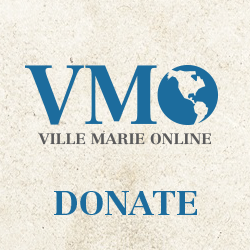
"Blind" Not Black and Whiteby Deborah Rankin |
"You are always telling us how you will make things better and then the better never arrives. How are you, Hannah, going to make things better?" – Alex
It's a cliché that there are none so blind as those who will not see.
However, Lindsay Wilson's new play “Blind”, produced by Scapegoat Carnivale Theatre and directed by Alison Darcy, takes a more nuanced view of how foreign aid workers might change the optics to see more clearly how they might best help people with albinism (PWA) - many of them children - who are attacked, mutilated, and murdered for their body parts, believed to have magical powers in some parts of Africa.
Wilson's interest in this grim topic grew out of joint research with Darcy while they were developing a response to a Concordia-based project on witchcraft. In the process, Darcy brought in some photos of kids from Tanzania, one showing a group with albinism, along with some blind children.
A blind boy at the centre of the photo caught Wilson's eye. She wondered how a child who couldn't see might tell his own story, much less relate the experiences of his school chums who had no pigment in their skin, hair, or eyes. The the two women created a fifteen-minute piece, telling the boy's story from his perspective, as they imagined it might be.
In 2011, Wilson had the opportunity to travel to Tanzania courtesy of a research & development grant from the Conseil des arts et des lettres of Quebec, under the auspices of Under The Same Sun, a Christian NGO with a mandate to assist children with albinism. There, she worked with UNICEF, evaluating schools for the blind where children with albinism are monitored and kept safe. “Blind” was the fruit of this endeavor.
The play blends documentary theatre with mythic storytelling, highlighting the contradictions between traditional healing - with its emphasis on indigenous herbalism and the admixture of African and Christian spirituality - and the dark arts of witch doctors who conjure up 'magic' potions made from the dismembered remains of people with albinism. The horrific truth is that a complete set of albino body parts can sell for $75,000.
In this fictionalized account, featuring a large cast of actors who do double duty, playing the parts of both the adult overseers and monitors, as well as the school children (which can take some getting used to) the protagonist Hannah (Lydia Zadel) must grapple with her own demons as she struggles to re-evaluate her perceptions about what the children need and how best to support them, a recurring theme in the crisis of humanitarian aid in Africa: Is the cause best served by gathering testimony and observation, or through direct intervention?
At first she is skeptical about the merits of traditional healing. However, when she finds herself haunted by a spirit in the form of a hyena in a series of hallucinatory dreams, she consults a local Baptist preacher turned traditional healer seeking a remedy to alleviate her fears and end the nightmares.
The children are also haunted by the ghosts of the past: memories of far-away homes and families they yearn to return to, but can't. For the primary purpose of keeping them at a school for the blind is provide a safe haven from albino body parts 'hunters’ who rationalize that it is OK to kill people with albinism because they are really ghosts and will cease to exist after death, a prevalent superstition in Tanzania that underlies the persecution of people without pigment. However, the play also broaches the subject of sexual abuse by a teacher who has been let go.
This world premiere, at once poetic and theatrical yet drawn from real-life events, makes use of a corrugated tin town-scape, overhead projections, traditional Tanzanian music, bird song and shadow work. A number of conspicuous set changes under glaring house lights, coupled with an unnecessary 10-minute warm-up for the actors in front of the audience before the show began adds nothing to the desired ‘documentary’ effect. However, given the serious issues at stake, the moving story-telling more than compensates for these minor annoyances.
Throughout the run, donations will be collected for Under The Same Sun to assist children with albinism with a special event planned for this Friday, April 11. After the show, keynote speaker and Chairman of the Board of Under The Same Sun, Peter Ash, a Canadian with albinism, will talk about the work being done in East Africa.
“We are driven by the belief that all persons have intrinsic value and are created in the image of God. Accordingly, we also believe that all persons are worthy of love, support and true dignity.” – Under The Same Sun
“Blind” concludes its run Sunday, April 13, 2022.
Scapegoat Carnivale at the MAI
3680 rue Jeanne-Mance
For further information:
Blind cast and crew
Under The Same Sun (NGO)
Related links:
First nations Truth and reconciliation, residential schools: Montreal Gazette article
People with albinism face challenges in East Africa: National Geographic article
UNICEF's approach to child protection: UNICEF article
Last Night at the Gayete

|
|
|
|
|
|
The Centaur Theatre's - season is drawing to a close with its final production of Last Night at the Gayety, a musical comedy by Bowser & Blue which runs until May 22nd. |
|
|


